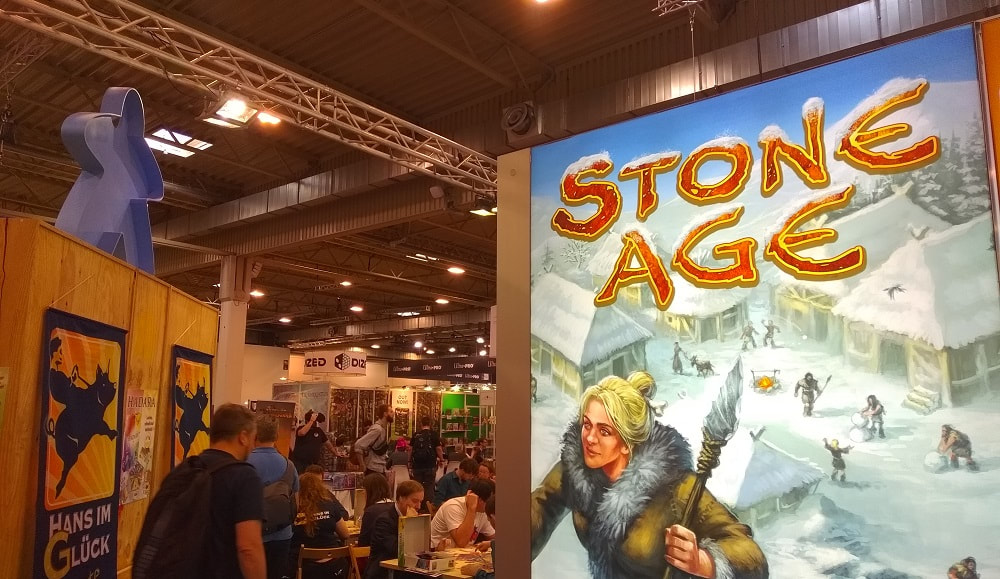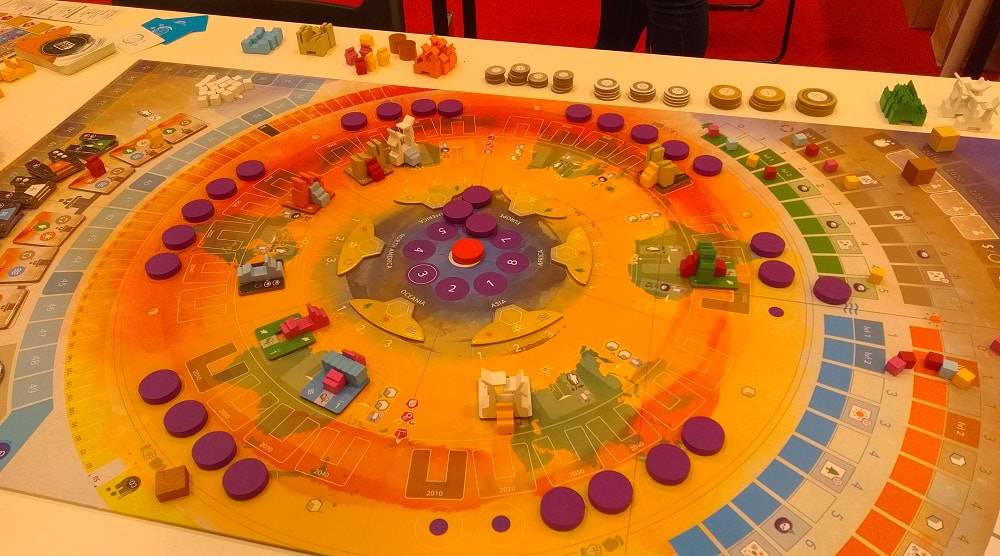|
SPIEL is the world's biggest boardgame fair. Specifically, it's 86,000 square metres in size, spread out over six halls of the Messe exhibition centre in Essen, Germany. This year, when I visited for the first time with friends from Witney Board Gamers, there were 209,000 recorded entries; 19,000 more than in 2018. It's clear to anyone paying attention that boardgames are growing rapidly as a hobby, with gaming groups and cafés popping up all over. The sheer size and popularity of SPIEL is even stronger evidence of this trend; the global boardgames market was already estimated to be worth $4.6 billion by 2018. While SPIEL - or "Essen" as it's often called - is the most important boardgames event in the world, it also fills a relatively specific niche. It is first and foremost a trade fair, and so it isn't so much playing games that is emphasises, but buying and selling them. The strong retail focus is clear as soon as you arrive; seasoned visitors are already dragging trolleys piled high with the latest releases and older games at bargain prices. Publishers are not only selling games to the public, but also holding meetings with designers and distributors behind the scenes. For that reason, booths often have their own hidden meeting rooms and business suits are as common attire at SPIEL as cosplay. The fair is overwhelming, especially at first. It isn't just the scale or the number of people - it's also the quantity of games being shown. BoardGameGeek's preview eventually reached a total of 1,247 games, from an array of hundreds of publishers. These companies aren't just based in the big boardgaming centres like Germany and the US; they're from places as varied as France, Spain, the UK, Indonesia, Taiwan, Japan, Italy, Russia and the Netherlands. Accordingly, it helps to have a plan about which games are available where, especially as the more hyped ones can sell out as early as the morning of the first day. Publishers, Great and Small There's a fairly clear hierarchy of publishers at SPIEL. The larger, better-established companies are identifiable by their multiple, professional booths complete with tills and uniformed staff. Queen Games were one example - their booths had an orderly system to move crowds through, as they sold new games like Rune Stones and Copenhagen as well as heavily discounted older ones like Armageddon. While Queen's games are almost all available in English versions, some of the German publishers are best avoided by those who can't read German. Further down the pecking order are the smaller stands, where you may be able to buy games directly from their designers who in some cases are at SPIEL partly to secure professional distribution. From time to time, you'll see nervous designers pitching their concepts to skeptical publishers. There are some real gems available from the smaller, more niche outfits, as well as a chance to speak directly to the designers themselves. One example for us was Fire Tower, the first game from Runaway Parade Games; another was the lean French zombie game Apocalypse au Zoo de Carson City which we were taught by co-designer Florent Toscano. "You mean like Monopoly?" It's a well-worn trope that those people outside the boardgames hobby tend to only be aware of dubious "classics" like Monopoly, Cluedo and Risk. It's a special thrill to be able to introduce people to the vast variety of games that have been published in the boardgames revival of the last 20 years, and SPIEL is a better showcase for these than any other. There are games at every level of complexity, from ten-minute fillers to sprawling epics. There are games focused on seemingly every conceivable theme, from animals jumping out of planes to hunting for treasure on the ocean floor. Whether deliberately or not, designers often create new games which breathe new life into familiar themes. Memories of dreary afternoons playing Cluedo may be banished by taking a look at either Paranormal Detectives or the beautiful Obscurio, new games launched at SPIEL '19 which cover similar ground but with the far superior modern mechanics of 2019. I wouldn't necessarily recommend SPIEL to those just getting started in the hobby; it's a fairly expensive proposition, and you need to have a good idea about the kinds of games you prefer before you can really make the most of the experience, Having been the first time, I am now very keen to go to something more playing- and less buying-oriented. Having games demonstrated to you at SPIEL isn't quite the same, as the person teaching you is doing so in the hope you'll reach for your wallet afterwards. With that being said, SPIEL is an amazing experience for established gamers and one I'd recommend anyone seriously into the hobby to have at least once. My Buys Being a natural planner, I made an extensive (colour-coded!) list of the games I was most interested in at SPIEL '19. Ultimately, I picked up six games and two small expansions for games I already owned (Harbour: High Tide and Flip City: Reuse, both from the US publisher Tasty Minstrel Games). On my return, I've ordered a seventh game I wouldn't have had room to bring back with me.
Aquatica (2019) I'd decided I'd buy one big box game at SPIEL, specifically one of the most hyped and acclaimed games at the fair. After considering Rune Stones and Medieval Realms, I eventually settled on Aquatica by Russian publisher Cosmodrome Games. An undersea-themed "hand-builder" game, it has beautiful art and an innovative "card-rising" mechanism. It hit #2 on the GeekBuzz list of most well-received games at the fair. Florenza Dice Game (2019) The original Florenza was released back in 2010 and isn't a game I've played; however I'd been meaning to try a roll-and-write game and the new version of Florenza that uses this mechanism seemed ideal. It's overwhelming at first, but is a very satisfying and surprisingly quick-playing game about building up a district in Renaissance Florence. SOL (2016) Definitely a hidden gem, SOL was originally released in 2016 but was being heavily discounted by Black Rock Games at SPIEL '19. It plays up to a huge eight people, and is a very tense team game about hunting for treasure on a mysterious island in the Atlantic. As is often the case with French games, the art is fantastic. Medievalia (2007) A fairly old game, Medievalia is (like Florenza) an Italian publication. It's a tableau-building card game about developing a fiefdom, and eventually going to war with rivals. After one play, I'm skeptical about this one - the rulebook is very poor. I'll need another, closer look at this one once I've downloaded alternate rules. It was a steal at 4 euros, though. Sundae Split (2017) The last game I bought at SPIEL was another bargain at just 5 euros. This one is similar to the better-known Sushi Go! in that the scoring works in the same way; however in Sundae Split the cards are acquired using the "I split, you choose" mechanism instead of card drafting. This very quick game has been a hit so far. Sprawlopolis (2019) The very first game I bought was the new edition of tiny "microgame" Sprawlopolis, published by Dutch outfit Quined Games. Using just 18 cards and coming in an extremely small box, this is primarily (to me) a solo game but also plays well with up to 4 players. It's a city-building game, about carefully combining cards to score points. Last Bastion (2019) This reimplementation of Antoine Bauza's earlier game Ghost Stories was being promoted by actors, including dressed as a hulking brute on stilts - it must have worked on me. It's a very attractive co-op game about defending the titular fortress against the forces of evil. Each player has distinctive powers, and the game looks great on the table.
0 Comments
Your comment will be posted after it is approved.
Leave a Reply. |
About
I write about classic science fiction and occasionally fantasy; I sometimes make maps for Doom II; and I'm a contributor to the videogames site Entertainium, where I regularly review new games. Categories
All
|








